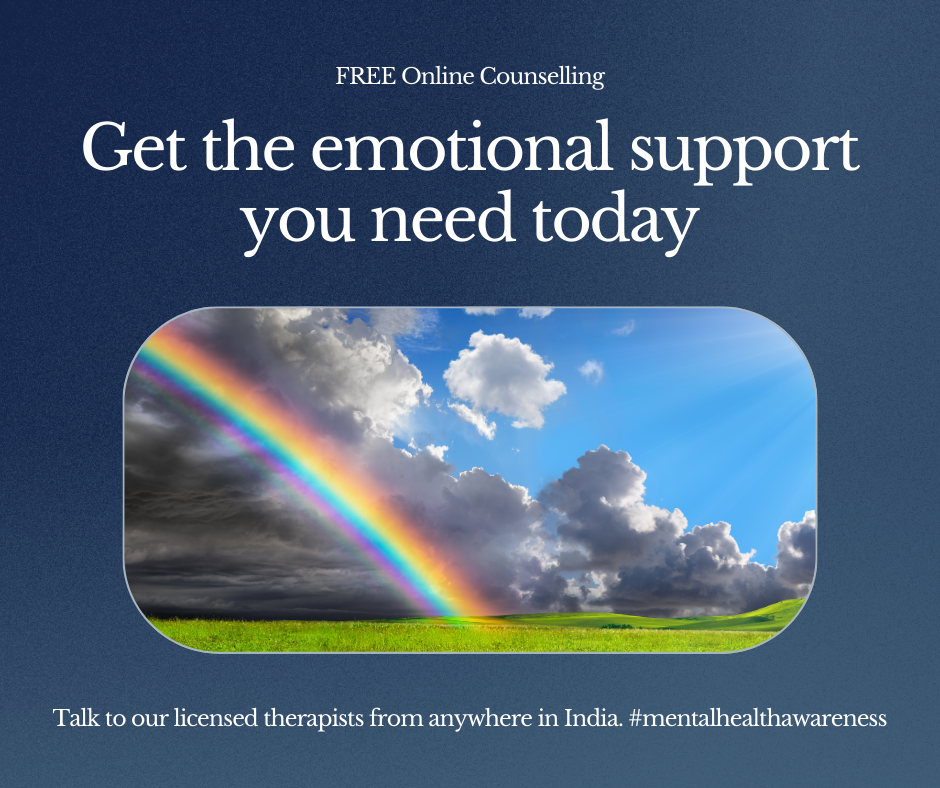Free Online Counselling and Therapy in India

Seeking Help:
Seeking help for mental health is important for several reasons. Firstly, untreated mental health conditions can worsen over time and lead to more serious problems. Secondly, it can lead to difficulty in daily activities like school, work, and relationships.
Additionally, seeking help for mental health can improve overall well-being and quality of life. Mental health treatment can help individuals learn coping mechanisms and strategies to manage symptoms, as well as address underlying issues that may be contributing to their mental health condition. It can also help reduce the risk of self-harm or suicide.
Also, it can help you to understand yourself better and improve your self-esteem and self-worth. It can help you to become more resilient and better equipped to handle life’s challenges.
In summary, seeking help for mental health is important because it can improve the ability to function in daily life, improve overall well-being and quality of life, reduce the risk of self-harm and suicide, and help individuals to understand and accept themselves.
What is Online Counselling and Therapy?
Online counseling and therapy refers to the provision of mental health services via the internet. This can include video or phone sessions, email or text-based communication, or use of a mobile app. Online counseling and therapy can be used to treat a wide range of mental health conditions and can be a convenient and accessible option for people who may have difficulty accessing traditional in-person counseling services. It is important to note that online counseling and therapy should only be provided by qualified and licensed mental health professionals.
Is free online counselling worth it ?
Free online counseling can be a valuable resource for individuals who may not have access to in-person counseling or who prefer the convenience of online therapy. However, the effectiveness of free online counseling can vary depending on the qualifications and experience of the counselor, as well as the individual’s specific needs and preferences. It is always recommended to do some research and read the reviews before engaging with any online counseling service. Additionally, it’s important to keep in mind that free online counseling may not be as comprehensive or private as paid counseling, and may not be appropriate for certain mental health conditions.
CareMe Health Approach?
CareMe Health Provides Evidence-based approach we make use of interventions and treatments that have been proven to be effective through scientific research. Our approach to mental health care involves using the best available evidence, including research studies and clinical guidelines, to inform the selection of interventions and treatments for individual patients.
Our expert therapist/counsellors use a combination of factors to make treatment decisions, including the patient’s specific needs, preferences, and values, as well as the available research evidence. This can include but not limited to cognitive behavioral therapy, interpersonal therapy, and pharmacotherapy.
“CareMe Health provides the most professional and the best online counselling in India and you can connect with the top psychologists, counsellors, and psychiatrists sitting at your home”.
10 Reasons for choosing the best counselling services over free counselling services
- Qualified and experienced counselors: Best counseling services typically employ counselors who are highly qualified and have a wealth of experience in providing therapy.
- Tailored treatment plans: Best counseling services will work with you to create a personalized treatment plan that addresses your specific needs and goals.
- Confidentiality: Best counseling services will ensure that your personal information and therapy sessions are kept confidential.
- Evidence-based practices: Best counseling services will use evidence-based practices and interventions that have been proven to be effective in treating mental health conditions.
- Flexible scheduling: Best counseling services will offer flexible scheduling options, so you can find a time that works best for you.
- Specialization: Some of the best counseling services may have specialized counselors with specific expertise in certain mental health conditions or populations.
- Supportive environment: Best counseling services provide a supportive and safe environment that allows you to feel comfortable discussing personal and sensitive issues.
- Follow-up: Best counseling services will follow up with you after your sessions to ensure that you are making progress and to make any necessary adjustments to your treatment plan.
- Cost-effective: While best counseling services may not be free, they can ultimately be more cost-effective in the long run by providing better outcomes.
- Professionalism: Best counseling services will provide a high level of professionalism, which can be reassuring and empowering for clients.
It’s important to note that free counseling services can be helpful for some people, but they may not have the same level of qualifications, resources and expertise as best counseling services do. It’s always worth considering the different options available before making a decision.
If you’re looking for top-notch therapy services, look no further than CareMe Health. We pride ourselves on being the best mental health providers in India, offering a level of service that cannot be found anywhere else.
Our platform boasts the most experienced and qualified psychologists and psychiatrists in the India, with a wealth of expertise in treating a wide range of mental health conditions.
Unlock the path to wellness today by booking a therapist on our platform
At CareMe Health, we provide an accessible and affordable virtual mental health platform, making it easy to receive the support you need, when you need it.
Related Articles

Letting Go With Grace: Emotional Tools for Closure
Letting go is never easy. Whether we are parting ways with a loved one, ending a relationship, leaving a job, or saying goodbye to a cherished chapter of life, the emotional weight can feel overwhelming. Yet, closure is essential for our emotional well-being. Without it, we carry unresolved grief, anger, regret, or longing that can seep into new relationships and experiences, holding us back from healing and growth.

Breakup Blues: How to Cope and Rebuild Your Self-Worth
A breakup often feels like a silent earthquake—unseen by others but devastating within. The pain doesn’t just come from the loss of a relationship, but from the crumbling of the life, identity, and future you built with another person. You may find yourself questioning your worth, doubting your value, and feeling isolated even when surrounded by people. In Indian society, where emotional expression is often discouraged and breakups can be stigmatized, this pain may feel even more overwhelming. But the truth is—while breakups may shake you, they do not define you. You are not broken; you are in a process of emotional reformation. And with the right tools, guidance, and support system, you can rebuild not just your self-worth but also your entire life narrative.

Healing After Heartbreak: A Mental Health Perspective
Heartbreak doesn't just break your heart—it can shatter your sense of identity, peace, and purpose. Whether the end was expected or abrupt, mutual or one-sided, short-lived or long-term, the aftermath often leaves people emotionally disoriented. In Indian culture, where societal expectations and family involvement in romantic relationships are prevalent, the pain is not just personal—it is public. Yet, very few are taught how to heal from emotional loss in a healthy, sustainable way.

Boundaries in Love: Saying ‘No’ Without Guilt
Love, in its truest form, should be a safe space—a space where individuality is not only respected but celebrated. Yet, in many relationships, especially in the Indian cultural context, love is often misunderstood as constant availability, complete sacrifice, and putting the other person first, always. As noble as this may sound, this version of love often leads to emotional exhaustion, suppressed resentment, and the erosion of one’s identity.

Gaslighting in Relationships: What It Is and How to Heal
Gaslighting is a form of emotional abuse that erodes your ability to trust your own perception. It’s a slow, insidious process that often begins with subtle doubts and ends with complete self-questioning. In romantic relationships—especially in the Indian context where silence, compromise, and duty are often mistaken for love—gaslighting can be even harder to recognize.

How Depression Can Affect Your Relationship—And What You Can Do
Depression is not just an internal struggle—it ripples outward, affecting relationships, routines, and the emotional fabric that holds people together. When someone is dealing with depression, it's not only their world that becomes dim—it can cast a shadow over their most intimate connections too. In a country like India, where open conversations about mental health are still rare and love is often equated with endurance, depression within a relationship can become invisible, misunderstood, or misjudged.
